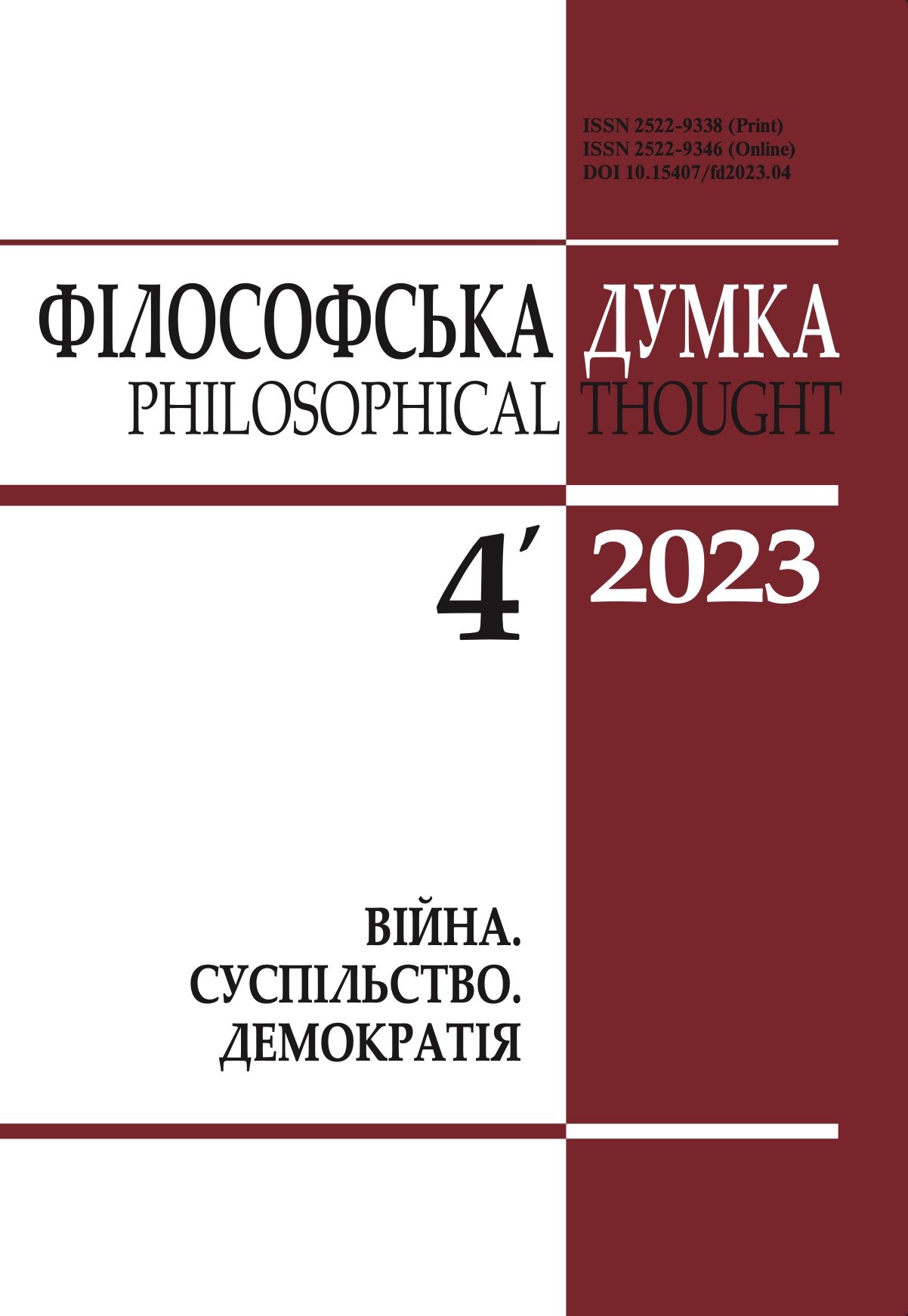Democracy as Ambitendent Phenomenon: Problems of National and Social Solidarity
DOI:
https://doi.org/10.15407/fd2023.04.039Keywords:
competitive and pluralist democracy, social democracy, ambivalence, ambitemptiness, hegemony, trade union, solidarity, democratic fatigue, political society, civil societyAbstract
The article’s intellectual core resides in the examination of social phenomena through the lenses of ambivalence and ambitemptiness. Democracy is conceived through the cultivation of the ideal of national solidarity within the framework of the “indivisible and unified nation” and revolution — values which, according to B. Anderson, individuals do not choose of their own volition. Nevertheless, it functions by virtue of structures that are freely chosen by individuals, specifically political parties and civil society organisations, among which trade unions assume a paramount role in ensuring social solidarity. The author posits that a functioning political democracy, viewed as a historically ambi temptuous phenomenon, necessitates the reanimation of sustained equilibrium between the for ces of social hegemony and counter-hegemony. This revival hinges on transformative shifts in the structure of civil society, particularly reinstatement of pivotal social functions to trade unions. The article underscores the phenomenon of unprecedented demonstrative solidarity exhibited by the Democratic Party of the USA towards the strike movement. The author emphasises that a fully-fledged European liberal democracy was established during its golden age, preceding financial globalisation, as a social democracy. Within its framework, competitive and pluralist elections were complemented by the possibility of nationwide strikes facilitated by trade unions capable of social mobilisation. Proposing the term “political society” to denote the phenomenon encompassing political parties and movements, the article argues that their viability depends on their connection with civil society structures. It is asserted that neither right-wing nor left-wing populism possesses the capacity to fully neutralise “democratic fatigue”.
References
Anderson, B. (2001). Imagined Communities. Reflections on the Origin and Spread of Na tionalism. [In Ukrainian]. Kyiv: Krytyka. [=Андерсон, 2001]
Gramsci, A. (2017). Prison Notebooks. [In Ukrainian]. Kyiv: Vpered. [=Грамші, 2017]
Zizek, S. (2011). The Breivik Incident or What Does Europe Want? [In Russian] Retrieved from: https://liva.com.ua/zizek-breivik.html [=Жижек, 2011]
Phillips, L., M., Jorgensen, L. (2004). Discourse Analysis as Theory and Method. [In Russian] Kharkiv: Humanitarian Centre. [=Филипс, Йоргенсен, 2004]
Fischer, C. (2022). Made in America: A Social History of American Culture and Character. [In Ukrainian]. Kyiv: Nika-Centre. [= Фішер, 2022]
Eisenstadt, S. (1999). To the reader of the Russian edition. In: Revolutions and the transformation of societies. Comparative study of civilizations. [In Russian]. Moscow: Aspect-Press. [=Эйзен-штадт, 1999]
Schumpeter, J. (1995). Capitalism, socialism and democracy. [In Ukrainian]. Kyiv: Osnovi. [= Шумпетер, 1995]
Bump, P (2023). Young voters are not interested in the institutions Biden needs. Retrieved from: https://www.washingtonpost.com/politics/2023/11/20/biden-democrats-young-voters
Deutsch, K.W. (1961). Social Mobilization and Political Development. American Political Science Rev., № 3 (55), 493-514.
https://doi.org/10.2307/1952679
Huntington, S.P. (2004). Who Are We - the Challengers to America's National Identity. New Delhi: Penguin Books India.
Mоuffe, C. (2000). The Democratic Paradox. London, New York: Verso.
Van Reybrouck, D. (2018). Against Elections: the Case for Democracy. New York: Seven Stories Press. Rueschemeyer, D., Stephens, E., Stephens, J. (1992). Capitalist Development and Democracy. Chicago: University of Chicago Press.
Smelzer, N.J. (1998). The Rational and the Ambivalent in the Social Sciences: 1997 Presidential Address. American Sociological Review, 1, 1-16.
Downloads
-
PDF (Українська)
Downloads: 194
Published
How to Cite
Issue
Section
License
Authors who publish with this journal agree to the following terms:
- Authors retain copyright and grant the journal right of first publication.
- Authors are able to enter into separate, additional contractual arrangements for the non-exclusive distribution of the journal's published version of the work (e.g., post it to an institutional repository or publish it in a book), with an acknowledgement of its initial publication in this journal.
- Authors are permitted and encouraged to post their work online (e.g., in institutional repositories or on their website) prior to and during the submission process, as it can lead to productive exchanges, as well as earlier and greater citation of published work (See The Effect of Open Access).


